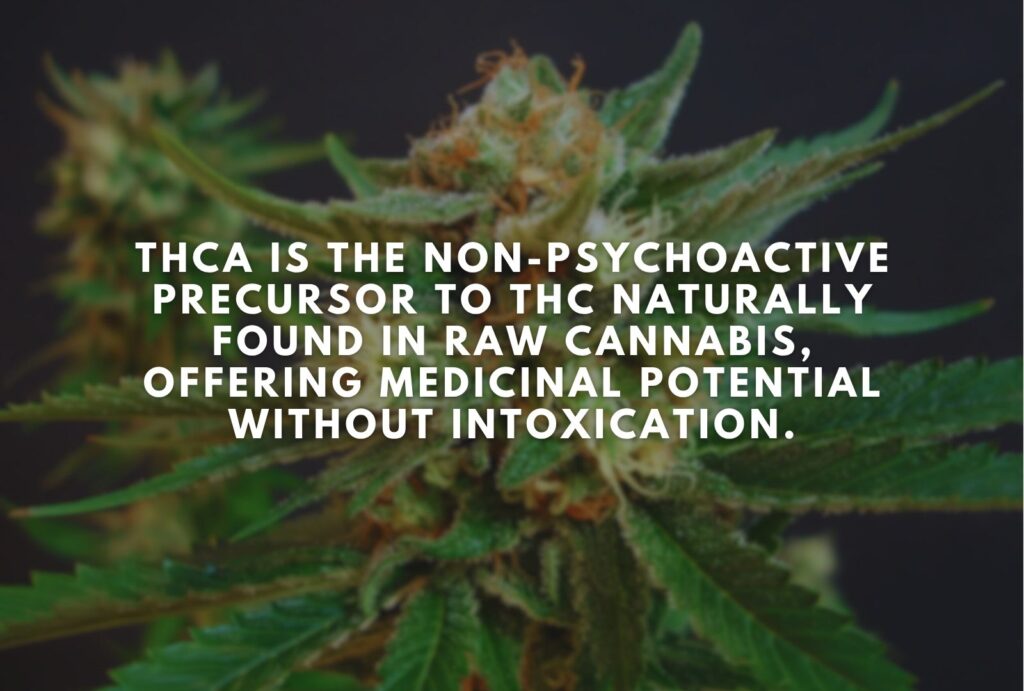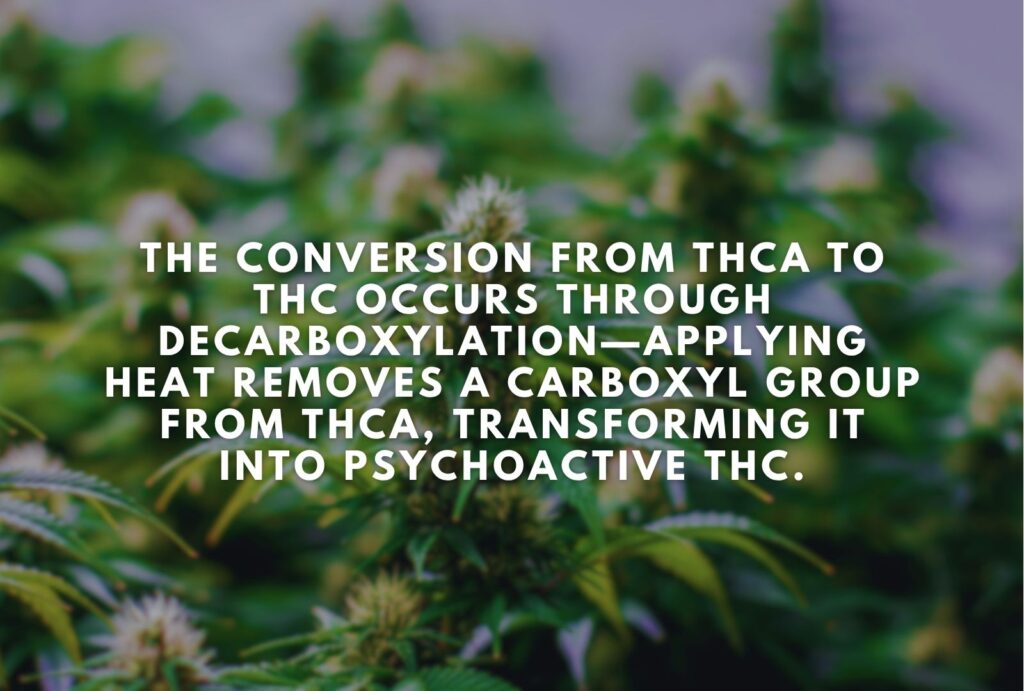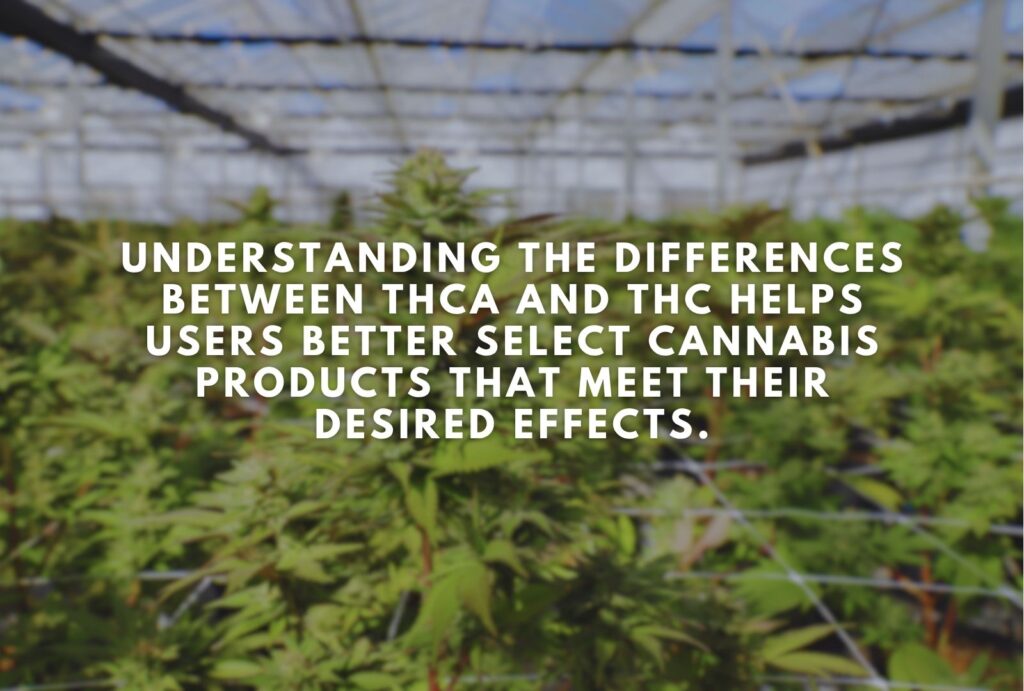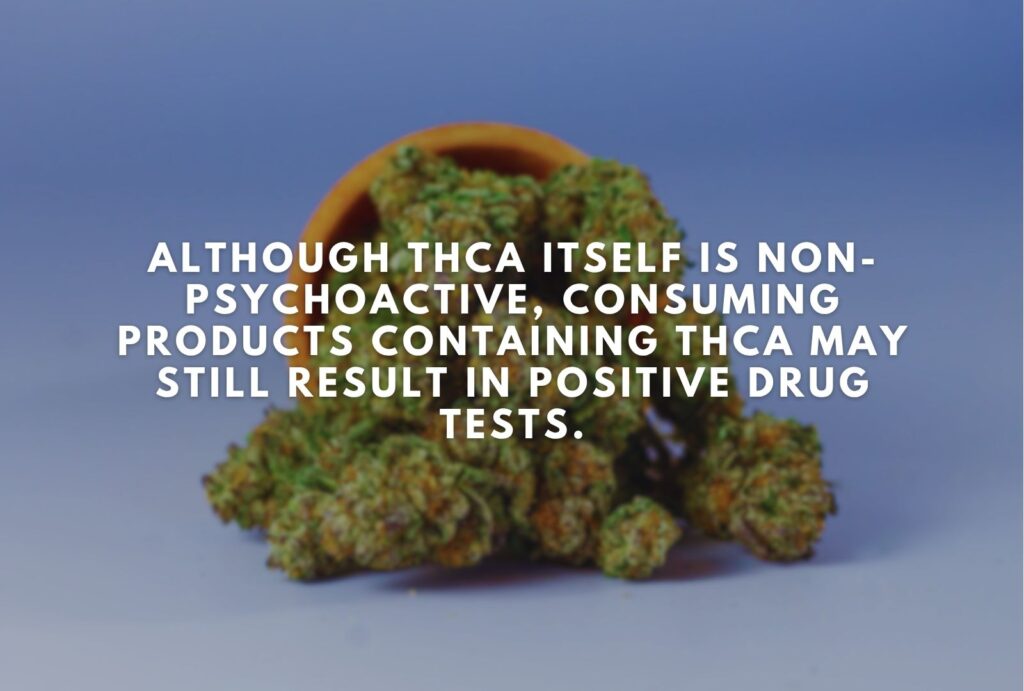THCA (tetrahydrocannabinolic acid) and THC (tetrahydrocannabinol) are two cannabinoids naturally present in cannabis. The main difference is that THCA is non-intoxicating and considered inactive, while THC is the psychoactive compound responsible for the “high” associated with marijuana.
Understanding the differences between THCA and THC helps users better select cannabis products that meet their desired effects.

What Is THCA?
THCA is the acidic precursor to THC naturally produced in raw cannabis plants. Fresh cannabis plants contain primarily THCA, not THC.
Key characteristics of THCA include:
- Non-Psychoactive: THCA does not cause intoxication or the feeling of being “high.”
- Unheated Form: Present in raw cannabis plants, especially cannabis flowers and leaves.
- Medicinal Potential: Research suggests THCA has anti-inflammatory, anti-nausea, and neuroprotective properties.
THCA converts into THC through a process called decarboxylation, typically triggered by heat (e.g., smoking, vaping, baking, or drying).

What Is THC?
THC is the main psychoactive cannabinoid found in cannabis. It interacts with the brain’s cannabinoid receptors, producing psychoactive effects such as euphoria, relaxation, and altered sensory perception.
Characteristics of THC include:
- Psychoactive Effects: Causes the characteristic “high” or euphoric feelings.
- Formed by Heating THCA: Decarboxylation transforms THCA into THC.
- Medicinal Uses: THC has well-documented therapeutic benefits, including pain relief, nausea control, muscle spasm reduction, and improved appetite.
How Does THCA Convert to THC?
The conversion from THCA to THC occurs through a process called decarboxylation:
- Heating: Applying heat (usually above 220°F or 104°C) removes a carboxyl group from THCA, converting it into psychoactive THC.
- Drying and Curing: Gradual decarboxylation occurs naturally over time during cannabis drying and curing.
Without this conversion, raw cannabis containing mostly THCA will not produce psychoactive effects.

Benefits and Effects of THCA vs. THC
Benefits of THCA
THCA offers potential medicinal benefits without psychoactive effects, including:
- Anti-inflammatory: May reduce inflammation and pain, potentially helpful for arthritis or chronic pain conditions.
- Anti-nausea: Could alleviate nausea symptoms.
- Neuroprotective Properties: Early research suggests THCA may protect nerve cells from degeneration.
Benefits and Effects of THC
THC’s psychoactive effects produce relaxation, euphoria, and sedation. Medicinally, THC provides relief for various conditions:
- Pain Management: Effective for chronic pain, arthritis, migraines, and inflammation.
- Anti-nausea and Appetite Stimulation: Helps patients undergoing chemotherapy or individuals with appetite loss.
- Sleep and Anxiety Relief: Provides relaxation and promotes better sleep.
How Are THCA and THC Consumed?
Methods of consuming THCA and THC differ significantly:
Consuming THCA
THCA is typically consumed via:
- Raw Cannabis Juicing: Fresh leaves and flowers consumed raw in smoothies or juices.
- **THCA Tinctures and Oils:** Formulated specifically without heat, preserving the acid form.
Consuming THC
THC consumption involves heating cannabis:
- **Smoking and Vaping:** Heat converts THCA into THC, delivering immediate psychoactive effects.
- **Edibles and Tinctures:** Cannabis-infused foods or tinctures undergo decarboxylation during preparation, providing longer-lasting THC effects.
Legality of THCA vs THC
The legal status of THCA and THC differs:
- THC: Federally illegal in the United States under the Controlled Substances Act, though legal for medical or recreational use in some states.
- THCA: Exists in a legal gray area. Some jurisdictions permit products high in THCA if the THC content remains below the legal limit (usually 0.3%).
Always verify local laws to understand the legality of cannabis products in your jurisdiction.
Will THCA Show Up on a Drug Test?

Although THCA itself is non-psychoactive, consuming products containing THCA may still result in positive drug tests. This occurs because standard drug tests detect THC metabolites, and THCA can convert to THC metabolites in the body.
Choosing Between THCA and THC Products
Choosing between THCA and THC depends on desired outcomes:
- Choose THCA Products If:
- You prefer medicinal benefits without psychoactive effects.
- You want to avoid intoxication or cognitive impairment.
- Choose THC Products If:
- You’re seeking psychoactive effects, relaxation, pain relief, or appetite stimulation.
- You have a medical condition effectively managed by THC.
Conclusion: THCA vs. THC
In summary, THCA is the non-psychoactive precursor to THC naturally found in raw cannabis, offering medicinal potential without intoxication. Conversely, THC is psychoactive, formed from THCA through heating, providing well-known medicinal benefits and recreational effects.
Understanding these distinctions allows individuals to select cannabis products tailored to their specific wellness or recreational goals.